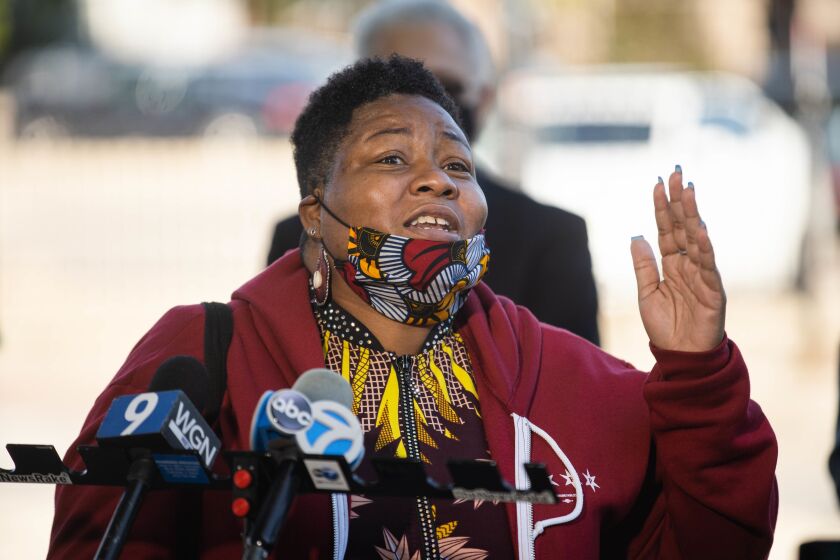Stateway Gardens and Robert Taylor Homes, that outcropping of high-rises for the poor that once lined the Dan Ryan Expressway, are long gone, their demolition an admission of failure in urban planning.
But the thinking from that era lives on, less visibly to many Chicagoans.
Consider Parkway Gardens, a 1950s development. Unlike the aforementioned projects, it didn’t rely on high-rises. Another difference is that it’s not “public housing,” strictly speaking. It’s privately owned, an investment for those who want the security of federal Section 8 rent subsidies and an assortment of tax breaks.
But it is massive, with 35 buildings stretching along Dr. Martin Luther King Jr. from 63rd to 66th streets and 694 units.
“Parkway is reminiscent of Stateway Gardens and Robert Taylor Homes. You’ve got the same issues,” said Charlton Hamer, senior vice president of affordable housing for the Habitat Co.
He’s not involved with the property but knows the challenges of doing subsidized housing well and profitably. The pandemic, he said, has made the business tougher by throwing low-income renters out of work.
Parkway’s issues start with crime, either within the complex or spilling into it from the area. Its stretch of King Drive was known as “O Block” for a gang member killed nearby in 2011. The Sun-Times identified it as the city’s most violent block in 2014.
As for the property itself, “it’s just too large and too dense and too isolated an area,” said a housing developer who didn’t want his name used. It’s next to a Norfolk Southern rail yard.
Parkway is getting attention because, after years of some progress, complaints about it have grown. Buildings Department inspectors, summoned to the place by an exasperated Ald. Jeanette Taylor (20th), found 50 violations in March. A month later, property owner Related Midwest put it up for sale. Related took it off the market in June.
There are at least two backstories here. One is that Related Midwest has a solid reputation as a developer of downtown high-rises but also with a specialty in projects for low- and moderate-income renters. It has partnered with the Chicago Housing Authority to revamp the former Lathrop Homes and the old ABLA Homes site on the West Side.
Related Midwest, the local division of New York-based Related Cos., bought Parkway for $40 million in 2011 and reports spending $58 million since then on capital improvements, security and social programs. Three years after its purchase, it garnered a prestigious award for the end result.
“Related was hailed as a hero when they bought it and when they put it on the market, everyone was surprised,” a housing expert said. To some, it meant Related was giving up on Parkway.
Its change of heart is the other backstory. Related has giant matters pending at City Hall. It’s the developer of the site it calls The 78, so named because Related imagines it as the 78th Chicago community.
It contains 62 empty acres running southwest from Roosevelt Road and Clark Street, and it’s in line for a $1.1 billion subsidy from tax increment financing. And it’s a prime site for a Chicago casino. The site selection is up to the city. All that’s slated for The 78 so far is a tech incubator for the University of Illinois.
Related showed its hand when it joined last year with Neil Bluhm’s Rush Street Gaming to answer the city’s call for ideas and interest in a casino. Since then, Related Midwest President Curt Bailey has been talking up the property as accessible to downtown crowds but with ample room for the hotel, restaurants, shops, parking and other things big casinos require.
Bailey declined to be interviewed.
Taylor said she’s discussed Parkway with Mayor Lori Lightfoot, who isn’t afraid to use the city’s leverage over Related.
“There’s no way they’re going to get a billion-dollar subsidy if they can’t take care of low-income and working families on the South Side of Chicago,” she said.
Taylor said she hopes for an update on the code violations. Many residents, she said, are reluctant to talk about deteriorating conditions.
A spokeswoman for the Buildings Department said many code issues have been addressed. Some electrical violations are pending and the department will monitor the work, she said.
The alderman said if Related wants to shed the property, it should help set up a co-op, which Parkway once was. One source suggested Related could establish an endowment and bring in a nonprofit owner, maybe to downsize the complex, make it mixed-income and build more units in Woodlawn, timing the investment to interest generated by the Obama Presidential Center.
Like any developer, Related worries about what City Hall thinks. If it wants its casino license, it might need to show some love to Parkway. Who says downtown projects for the wealthy can’t benefit a neighborhood?







